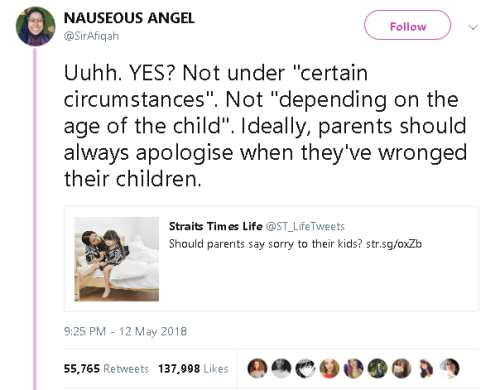leebrontide: blueboxness:missmeggo929:heyblackrose:yourejustanotherversionofme: gahdamnpunk:Why is t
leebrontide: blueboxness:missmeggo929:heyblackrose:yourejustanotherversionofme: gahdamnpunk:Why is this even a question? How is your child meant to learn to apologize when you don’t do it yourself as a parent? This is actually a really important factor in how I establish healthy, trusting relationships with kiddos at work. I am a human and therefore make mistakes, which children will catch and call me out for, because children are information sponges with no verbal filters. When a kid says, “but miss tommy, i thought you said we’re not supposed to do that,” I answer, “You’re right. I’m sorry, I shouldn’t have done that. I won’t do it again.” It could be something small, maybe a kid sees me biting my nails, or maybe I grabbed a kid by the arm who was about to collide with something solid but I grabbed too hard. Whatever it is, it’s important to acknowledge the mistake, apologize to the kid, and verbalize a plan to correct it. Not only does this model HOW to make an effective apology, but it establishes trust on many levels. The children who witness the exchange now know that:I will be honest with them even if it does not serve my ego,I care about their feelings,and I am taking their needs seriously. Apologize to your kids when you mess up! It won’t diminish your authority as their grown-up, it shows that you respect that authority! This is one thing emotionally abusive parents are known for. Holding power over accountability and they wonder why their children don’t want to be around when they get older. We apologize to each other in our home. We model it between the adults so she sees EVERYONE says sorry. And if we get angry or frustrated? We apologize for using an angry voice and take ownership of the emotion and either do a do over or use restorative justice. We can’t ask the kiddos in our house to do something we don’t. I’m flabbergasted that this is even a question. That’s like asking “Do you want your kid to be unbearable for others to be around OR emotionally abused?” Apologize to your kids, fam! Teach them by example. So when I was like, 8, I was playing with my dad one evening, and he lost his wristwatch in the process. We cleaned up before bed, and the next morning he realized his watch was missing.Back then, because I’m old, a wristwatch was actually a really important and useful, as well as expensive object. Rushing out the door to work, he ended up tossing every toy y sister and I owned on the floor, looking for it. I remember so vividly sitting on the couch, watching him doing this, and telling him “mom will be mad”. He promised me he would explain it to her before he left the house.He forgot. Mom came in, saw that our recently cleaned room was a total and utter disaster and, as fortold, got mad. I tried to tell her DAD had made the big mess. I suspect I didn’t explain it very well, because she’s generally someone who listens to me and trusts me. She made me clean up the whole mess myself and I was as resentful and bitter as my little 8 year old heart knew how to be.That evening, my dad comes home, and I angrily tell him what happened, and that he forgot to tell mom.He didn’t hesitate for a moment to apologize to me, sincerely and earnestly. Then he explained the situation to my mom, in front of me, so I could see him take accountability. Mom then also apologized to me for not believing me. I think the promised me one free mess that they would clean up after me, but my memory gets a little hazy around that point.The main thing I remember about this, is that I walked away with a sense that if I was wronged, I deserved an apology and for someone to try to make it right. AND I walked away with a warm cozy sense of trust that if my parents were the ones who wronged me, they would treat me with kindness and respect and do their best to fix it. It’s that sort of thing that has kept my relationship with them both so good, even now I’m well into middle age.My life is very much improved with the well ingrained expectation that I deserve respect, and with good models of HOW to be respectful to others. They didn’t just tell me to be respectful. They showed me how it was done.And now, that’s a guiding principle in my own parenting. -- source link
Tumblr Blog : gahdamnpunk.tumblr.com



